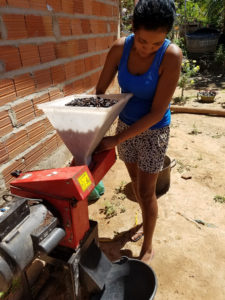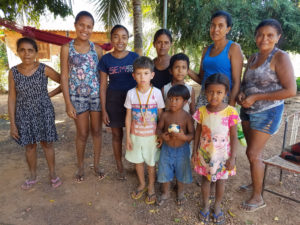Original post by Chung-Wha Hong and Lydia Simas for Grassroots International on January 25, 2019.
Babaçu nut harvesters in the northeast of Brazil have been struggling for free access to the land and forests that provide livelihoods for thousands of rural families. We went to visit a community of babaçu nut harvesters – known as quebradeiras de côco de babaçu, meaning babaçu nut breakers – the state of Maranhão. Quebradeiras collect and crack open babaçu fruit to make oil and flour out of the flesh and charcoal from other parts.

According to a Guardian article, over 100,000 families are estimated to depend on babaçu for subsistence, necessary for survival. (Other sources quote as many as a million people.)
Grassroots International’s partner, ASSEMA (the Association in the Settlement Areas of the State of Maranhão), provides technical, organizational and political support to communities of babaçu nut harvesters, Quilombola (Afro-descendent) communities, youth and families in settlements, working with them to implement small-scale family agriculture and production. Since much of the land where babaçu trees naturally grow has been privatized, communities that traditionally depended on babaçu have lost access the areas where they can collect the precious nuts that sustain their families and communities and are instead forced into low-wage work for the landholders.
A babaçu nut harvester and community leader told us about some of the accomplishments of her community and big challenges. She was the most animated when she talked about how she and her community changed. They used to pay “rent” at a price imposed by the fazendeiros (landowners) in order to gather babaçu nuts in the area, which her community has been doing for generations.
“It was very humiliating. I had to pay to get the coconut and even then they treated us as if we were stealing something, and we only took the coconut, did nothing else on the land,” recalls Dona Maria Celsa. At 50 years of age, she has been harvesting babaçu coconuts for 43 years. She says, “I am a coconut breaker and I am very proud to say that!”
This is how it was until recently, but things have changed. Dona Maria went through an empowering transformation as she began thinking more about how they used to have access to babaçu before the fazendeiros got there. She helped to organize the community, and now they have decided stop paying rent to the fazendeiros. Our political ally CPT (the Pastoral Land Commission/ Comissão Pastoral da Terra) also provided organizing support, technical assistance and advocacy strategies.
Through this work, the community has been able to educate themselves, and in the process, also connect up with other quebradeiras in the region. She shared that before, there was a fence in her head, a mental fence. And that fence had to be torn down first before they could take collective action against the physical fence. Despite numerous threats from the landowner, they continue to not pay “rent.”
The retaliation from the fazendeiros has included them cutting down the coconut trees or poisoning the trees, and making up new rules like allowing them to only pick up the nuts from the ground and not shake the tree like they usually do. One time, the fazendeiros tried to cut down a coconut tree and several little boys from the community stood in front of it and blocked them from cutting it down.
Through organized advocacy over the years, quebradeiras have succeeded in securing a minimum price guarantee for babaçu – nuts an important victory for them. Despite this, government bureaucracy and political antipathy have made it almost impossible for quebradeiras to access the benefits they are entitled to. For example, every applicant must have an email address and fill out long, complicated forms. To make matters worse, some corrupt people have offered to help the quebradeiras fill out the paperwork and navigate the bureaucracy, but in the end they have ended up stealing their money and without helping them at all.
The women we met see their struggle as going beyond their livelihood to include environmental sustainability. Quebradeiras gather the babaçu nuts in a sustainable way, and preserve the forests, whereas many landowners want to clear the forest and use the land for grazing cattle or monocultures like soy or eucalyptus. The resulting deforestation depletes the soil, which had served as a natural carbon sink, while shifting toward producing for exports rather than food to feed local communities.

Since almost all the quebradeiras are women, the organizing is naturally led by women. In the community we visited, we met an elderly woman whom they introduced to us as the Matriarch. She doesn’t break nuts any more but cultivates an extensive and beautiful flower garden. We asked whether the community is matri-focal and they said yes – when men get married, they come to the woman’s house, we don’t go to the man’s house. Many men are away at various plantations for seasonal jobs to help supplement the income from the babaçu nuts.
After the community got organized, they also successfully demanded running water from the municipal government. She proudly showed us a faucet coming up from the ground, in her front yard. She said, however, her house almost didn’t get the water because the fazendeiros tried to pressure the government to stop the pipe going to her house, when they were laying the water pipes to all the households.
One time, she ran into some people associated with the fazendeiros in a nearby town and they told her, if she continues to be difficult, her body will be found on the side of the road with ants crawling out of her mouth. This was a threat against her life.
But for now, the women are determined as a community to continue organizing so that they can pass a law that guarantees free access to all the babaçu coconut trees, as part of the Babaçu Livre campaign. In the region, there are already certain municipalities that have successfully passed these free access laws. Maria Celsa is working toward passing the law: “My dream is this, to see this law approved, and to see that our struggle has paid off. Passing the law will be worth all the struggle.”
And further, the community increasingly believes that access alone is not enough, that their rights to the land they have lived on and gathered nuts on for generations, should come before the rights of the encroaching fazendeiros or other agro-businesses who want to deforest massive areas surrounding their community.
Although the struggle will be hard, they are organized, connected with allies like CPT for legal and organizing support, linked with other quebradeira communities, and developing deep solidarity networks with other rural peoples – including through the People’s Web/ Teia dos Povos, which brings together Indigenous Peoples, Quilombolas, traditional communities and others to support each other in defending their land and territory.